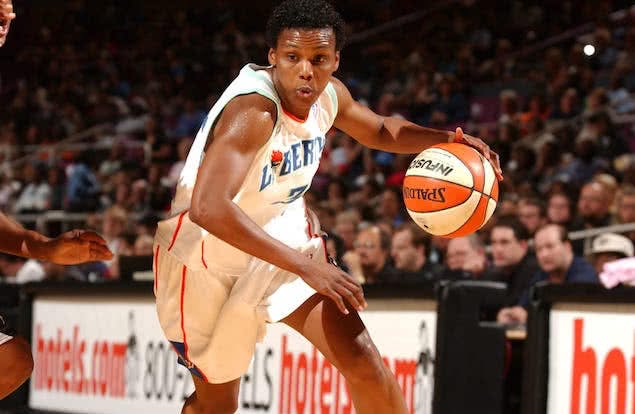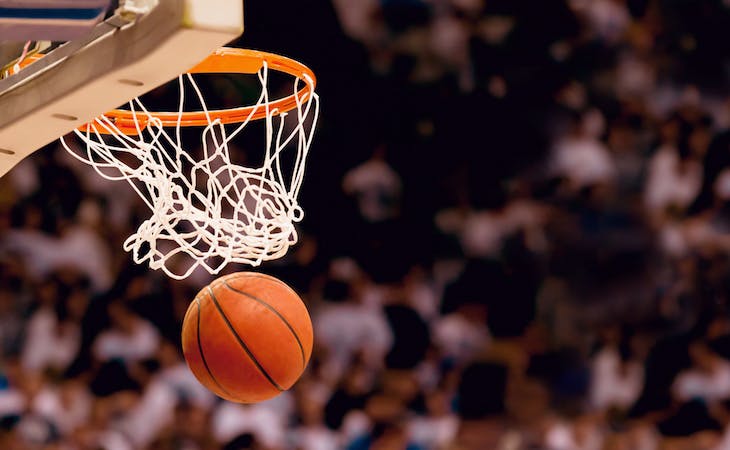This year’s college basketball season has been more unpredictable than usual due to the challenges posed by Covid-19—and there’s no telling who’s going to win the NCAA tournament this year.
One thing’s for certain, though: Athletes who prioritize sleep perform better.
“Resting is a championship habit, and it’s something that the elite do,” says Crystal Robinson, a former WNBA player and newly retired coach in the WNBA for the Dallas Wings and is the author of the forthcoming memoir, Finding Myself. “I can promise you this: There’s a reason why players like LeBron James are great. They get the rest, they get in the gym, and they do the work. They are fueled and ready for their workouts.”
Here, learn more about how sleep impacts your favorite basketball players on the court—and what you can do to sleep like a pro athlete to maximize your workouts.

The benefits of sleep for basketball players
An athlete’s body is like a sports car, says Robinson: “What you put into it and how you take care of it determines how it’s going to perform. And to me, sleep is one of those key ingredients you have to put into your body for it to perform at optimal levels.”
Research shows sleep has a serious impact on a basketball player’s game. In one Stanford University study, for example, men’s college basketball players who increased their sleep to 10 hours a night were able to run faster in both half-court and full-court sprints.
Their shooting also improved by 9% for free throws and three-point shots—something that could very well decide a game. What’s more, the players also reported improved physical and mental well-being.
On the flip side, sleep deprivation can lead to a whole host of issues for basketball players, including lack of focus, increased rates of injury, and an overall lower level of performance, says Kristin Weitzel, certified fitness trainer, certified breath and exposure training coach, nutrition specialist, and global brand ambassador for FlexBEAM.
“This could be due to a lack of deep sleep, which plays an important role in restoration and recovery for your mind and body as well as enabling muscle growth and repair—all important for in-game endurance,” she explains.
The bottom line: “Sleep is of the utmost importance for several key factors related to basketball performance,” says Weitzel. “There is quite a large body of literature on athletes showcasing negative effects of sleep deprivation—typically under six hours of sleep nightly—decreasing accuracy, faster exhaustion, and decreased reaction time.”
How to sleep like you’re an elite basketball player
What can athletes do to get the sleep they need to dominate on the court? The following tried-and-true tips can be used by elite basketball players and everyday workout enthusiasts alike to improve sleep and performance.
Head outside in the morning
A dose of morning sunshine will set you up for a good night’s sleep. “Getting enough early sunlight helps set up circadian rhythms for the day as well as starts the energy cycle so we can sleep better and earlier as needed to get longer sleep duration,” says Weitzel.
Stay hydrated throughout the day
“Getting rest and being hydrated go hand in hand for an athlete,” says Robinson. In fact, research finds short sleep duration is associated with inadequate hydration. And both sleep deprivation and dehydration can do a number on your performance.
Drinking plenty of water before a workout is the first step to staying hydrated, but Weitzel notes that hydration for athletes goes beyond H20. You need to focus on replacing sodium and electrolytes, which are lost through sweating, she says.
One easy way to replace sodium and electrolytes is by sipping a sports drink. If you’re working out for an hour or more, the NCAA recommends guzzling a few gulps of a sports drink every 15 to 20 minutes to help maintain your energy and electrolyte levels so you can continue to kick butt. “Long-term hydration needs to be as stable as possible on big game days,” says Weitzel.
You can also up your hydration by eating fruits and veggies, which are full of water, vitamins, and minerals. If you’re a salty sweater, you can replace the salt post-workout with drinks and watery foods that contain salt, such as vegetable juice or broth-based soup.
Related: 5 things to look for in a mattress if you love working out
Try red light therapy
There are lots of trendy treatments out there that may be able to help you snooze. One of Weitzel’s favorites for athletes, in particular, is red light therapy, which involves exposing your skin to a lamp, device, or laser with low-wavelength red light.
Proponents of this treatment say red light can do everything from increase collagen production in the skin to speed up wound healing to reduce pain to boost sleep. One small study shows red light treatment was successful in improving the sleep of female basketball players. (Here are more trendy wellness treatments to help you sleep.)
Make sleep a top priority
Making the effort to rest will pay off when it comes to your performance. “My best advice is to make rest an important part of your routine,” says Robinson,” so you can be the best player that you can be in every game because it basically boils down to being sharp and your body being ready to perform at the levels that you want it to perform.”
For more sleep advice for athletes, check out these articles:
- What a Professional Sports Trainer Knows About Sleep (That You Don’t)
- How to Sleep Like an Olympic Athlete
- 6 Best Sleep Tips for Runners




